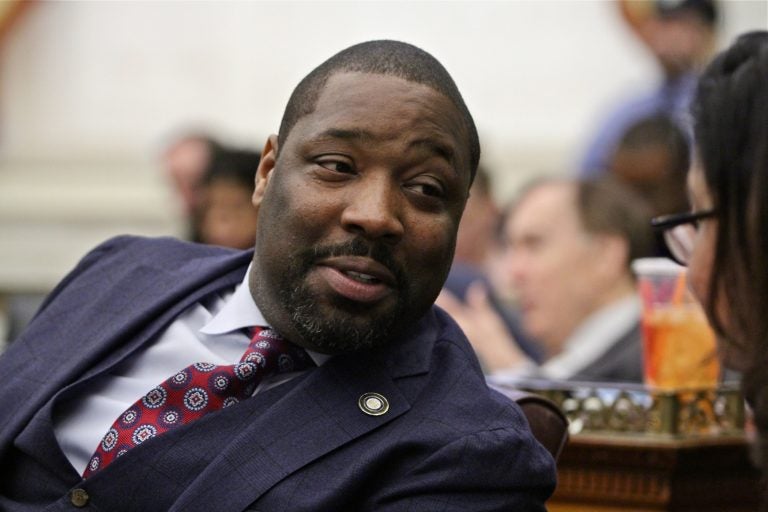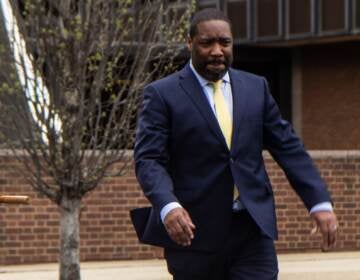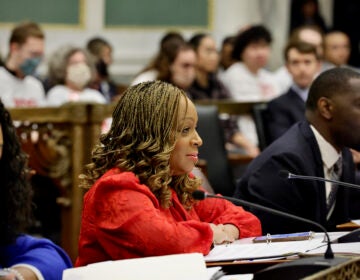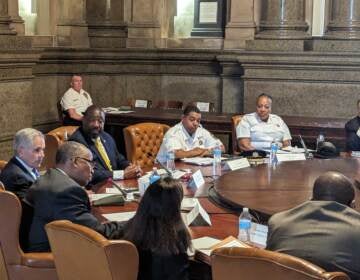Attorneys square off to start retrial for Philly Councilmember Kenyatta Johnson
In April, a federal judge declared a mistrial after the jury couldn’t reach a verdict. Now Johnson and his wife are back in federal court for round two.

Philadelphia City Council member Kenyatta Johnson. (Emma Lee/WHYY)
Did a Philadelphia nonprofit hire the wife of City Councilmember Kenyatta Johnson in service of a bribery scheme that saw Johnson accept nearly $67,000 for a pair of political favors?
Or was the part-time consulting contract between Universal Companies and Dawn Chavous completely above board?
Those were the competing narratives attorneys offered to a federal jury during their opening statements on Friday, the first day of testimony in a retrial that again threatens to end Johnson’s political career and send the three-term Democrat to prison for decades.
Following a mistrial in April, federal prosecutors quickly moved to retry Johnson, Chavous, and two former executives at Universal, Abdur Rahim Islam, who served as CEO, and Shahied Dawan, who served as CFO.
The second trial is not expected to include any new evidence. And the pool of potential witnesses is largely the same. But while previewing the government’s case to a new jury, Assistant U.S. Attorney Eric Gibson tried a slightly different tack, focusing more on Universal’s finances while steering clear of Johnson’s.
Gibson told the panel that ongoing money problems at the nonprofit prompted Islam and Dawan to turn to Johnson, a longtime ally, for help holding onto valuable real estate that Universal owned in Johnson’s legislative district in South Philadelphia. And that Universal hired Chavous so the company had a way to conceal the $67,000 the nonprofit allegedly paid Johnson for his assistance.
“Bribery in the 21st century is not cash in a bag in the middle of the night,” said Gibson. “The nonprofit has to account for the money leaving its coffers and the public official doesn’t want a paper trail leading back to his pockets.”
In exchange for the bribe money, prosecutors say Johnson introduced zoning legislation in 2014 that enabled Universal to maintain control of the Royal Theater on the 1500 block of South Street, then a crumbling eyesore the company was in danger of losing as a result of a conservatorship petition filed in state court.
The bill, introduced shortly after Chavous submitted her final invoice to Universal, rezoned the Royal, making it possible for the nonprofit — or any other developer — to bring a mixed-use project to the site, while effectively ending the legal effort to separate Universal from the former entertainment venue.
Less than two years after Johnson’s legislation passed City Council, Universal sold the Royal for $3.7 million, more than 10 times the amount the organization paid for the property in 2000.
The bribe money was also allegedly paid to Johnson for using his councilmanic prerogative to stop the city in 2014 from reclaiming vacant land that Universal owned on the 1300 block of Bainbridge Street. This came after the company, along with the Philadelphia Housing Authority, violated a 2005 agreement to build housing on the land. Prosecutors say Johnson’s position created a “chilling effect” that enabled Universal to keep the parcels and avoid a legal process known as reversion.
Gibson told jurors both official acts boiled down to “quid pro quo corruption.”
The case’s defense attorneys argued the government has no evidence to support Gibson’s claim, only an “empty theory” of a bribery scheme involving Johnson and his three co-defendants.
Thomas Fitzpatrick, who represents Dawan, pushed back on Universal being financially distressed, saying the nonprofit had an annual budget that is tens of millions of dollars above the amount of the bribe.”
“A $60,000 bribe to save a $60 million operation? Does not have the ring of truth,” said Fitzpatrick.
Patrick Egan, Johnson’s lawyer, said the councilmember’s wife was a “highly-respected” consultant who was well-positioned to help Universal, which hired Chavous to help spread the word about Universal’s network of charter schools to wealthy individuals and institutions with a history of supporting the movement.
“It’s not like they found her at the Wendy’s drive-thru,” said Egan.
The trial could take a month to complete.
Johnson and Chavous face up to 40 years in prison if convicted.

Saturdays just got more interesting.
WHYY is your source for fact-based, in-depth journalism and information. As a nonprofit organization, we rely on financial support from readers like you. Please give today.








